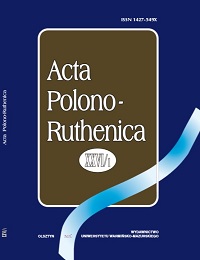Образ Родины в богословско-поэтическом конструктивизме архимандрита Евфимия (Вендта)
The Image of the Motherland in Theological and Poetic Constructivism of Archimandrite Euthyme (Wendt)
Author(s): Mikhail BogatyrevSubject(s): Language and Literature Studies, Studies of Literature, Philology, Theory of Literature
Published by: Wydawnictwo Uniwersytetu Warmińsko-Mazurskiego w Olsztynie
Keywords: literature of the Russian diaspora; religious and philosophical tradition; sophiology; the Parisian intellectual school; theological modernism; orthodoxy; Archimandrite Euthyme (Wendt)
Summary/Abstract: Archimandrite Euthyme (Wendt; 18941–1973) is one of the most myste-rious figures of Russian Orthodoxy in post-war France. While the philosophical heritage of Aleksandr Berdyaev and Sergey Bulgakov has been studied in sufficient detail, the mystical poetry and linguistic theology of archimandrite Euthymius are still inaccessible even to specialists, and his belonging to the Russian religious and philosophical tradition has a shade of outsiderism. The treatise Drawing and naming of decisions of the Detached, written by archimandrite Euthymius in his declining years, has no direct analogs in any of the existing genres. The ideas of a lost paradise and the Way of the Cross of Russia can be considered leitmotifs for the entire post-revolutionary Russian emigration. In the treatise of archimandrite Euthymius, the image of the crucified homeland is identified with Sophia the Wisdom of God. Topologically, Sofia is related to the Holy Thrones of Novgorod, Kiev and Moscow. These Thrones occupy a special place in the ideological system of archiman-drite Euthyme, who considered them an expression of the invisible mystical stronghold of the Church of Christ. The trinitarian Throne construction serves the ascension of Russia, which stands in heavenly concealment before the eyes of the Lord, awaiting the Last Judgment. In his mystical and literary studies, archimandrite Euthyme relied on numerical proportions and geometric concepts. The same concepts formed the basis for the idea of the temple, which he built in the French village Moisenay. This unique project of the church building organically fits into the visual aesthetics of the Russian avant-garde.
Journal: Acta Polono-Ruthenica
- Issue Year: 1/2021
- Issue No: XXVI
- Page Range: 39-54
- Page Count: 16
- Language: Russian

